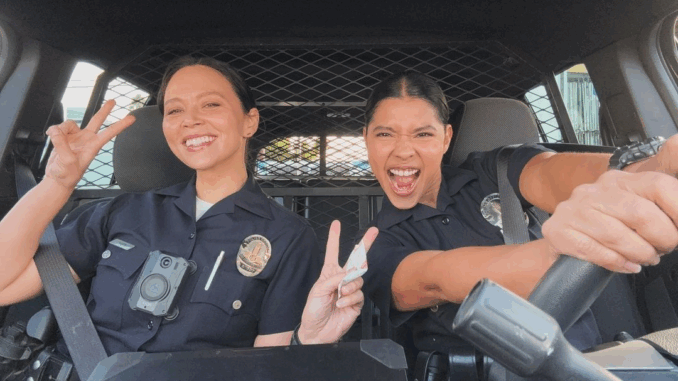
In the high-stakes world of television drama, what happens offscreen can sometimes rival—if not overshadow—what plays out on camera. The Rookie, ABC’s hit police procedural known for its fast-paced action and moral complexity, found itself in hot water not because of a controversial storyline, but because of a real-life storm that hit the cast and crew behind the scenes.
The departure of actress Afton Williamson, who played training officer Talia Bishop in Season 1, marked a turning point in the series’ history—sparking intense public scrutiny, raising questions about workplace conduct, and exposing the cracks in an industry still grappling with accountability.
🎭 The Exit That Sparked a Firestorm
In 2019, just as The Rookie was finding its footing with viewers, Afton Williamson abruptly announced she would not return for Season 2. Initially, the reason seemed unclear. But soon, the actress went public with serious allegations: she claimed she had experienced racial discrimination, bullying, and sexual harassment on set—and that her complaints were ignored by the show’s leadership.
In a powerful Instagram post, Williamson named specific individuals involved and accused production of failing to protect her. The post went viral. Almost overnight, The Rookie—once seen as a progressive, thoughtful police drama—was caught in the whirlwind of a real-life controversy.
🕵️ An Investigation and a Divided Response
ABC and Entertainment One, the studio behind the show, launched an independent investigation. Months later, they released a statement saying the claims could not be substantiated, and that no unlawful behavior was found. But by then, the damage had been done—not just to reputations, but to trust.
The response from the fanbase and media was sharply divided. Some accused the show of sweeping serious issues under the rug. Others felt the investigation cleared the show, and that it was time to move on.
Williamson, meanwhile, stood by her claims and exited the series permanently. She received support from some members of the entertainment community, though not all her Rookie co-stars publicly commented—something that drew further criticism.
🎬 Nathan Fillion, the Face of the Show, in the Hot Seat
As the series lead and executive producer, Nathan Fillion found himself in an awkward position. While not directly implicated in the allegations, his silence and lack of visible support for Williamson raised eyebrows. Many expected a stronger stance, especially given his offscreen role in shaping the show’s environment.
In a later interview, Fillion described the situation as “painful and complex,” but some fans felt it was too little, too late. Others defended him, pointing out that executive producers are not always privy to HR matters in large productions.
Regardless, the moment changed how the public viewed the show—not just as entertainment, but as a workplace.
📺 The Show Moves On, But the Stain Remains
The Rookie eventually recovered in terms of ratings and storyline. The introduction of new characters like Detective Nyla Harper brought fresh energy and deeper layers to the show’s exploration of justice and systemic issues. But for many, the behind-the-scenes drama left a lasting impression.
In a television era increasingly shaped by #MeToo, #TimesUp, and calls for greater diversity and transparency, The Rookie became a case study in how quickly public perception can shift—and how deeply audiences now care about what happens off camera.
🧠 What We Learned
The offscreen controversy surrounding The Rookie was more than just tabloid fodder—it was a reminder that even the most polished productions are made by people, and people bring with them both brilliance and flaws.
The situation sparked important conversations about accountability, race, and safety in the entertainment industry. And while The Rookie continues to grow as a show, the Afton Williamson controversy remains a chapter it can’t quite close—nor should it.
Because as The Rookie often teaches us on screen: real justice starts when people speak up.
